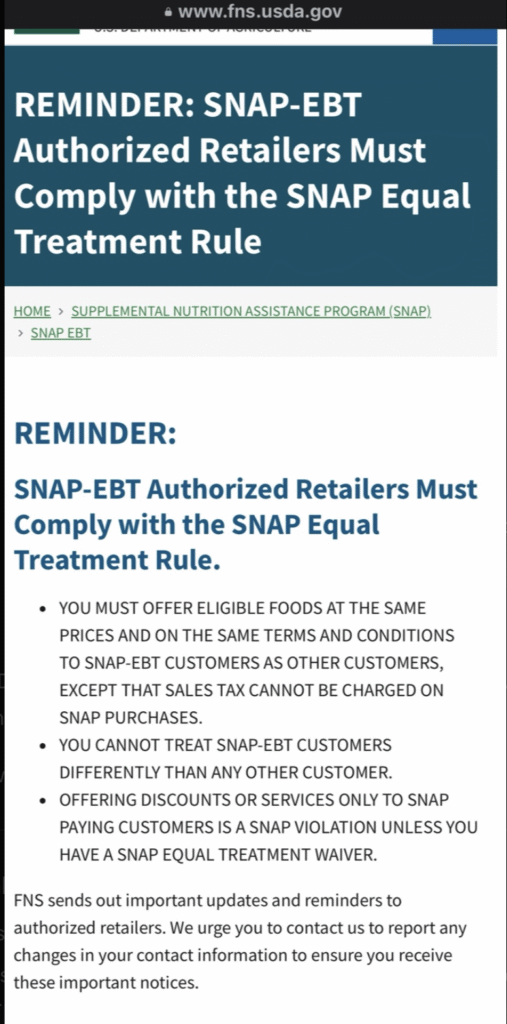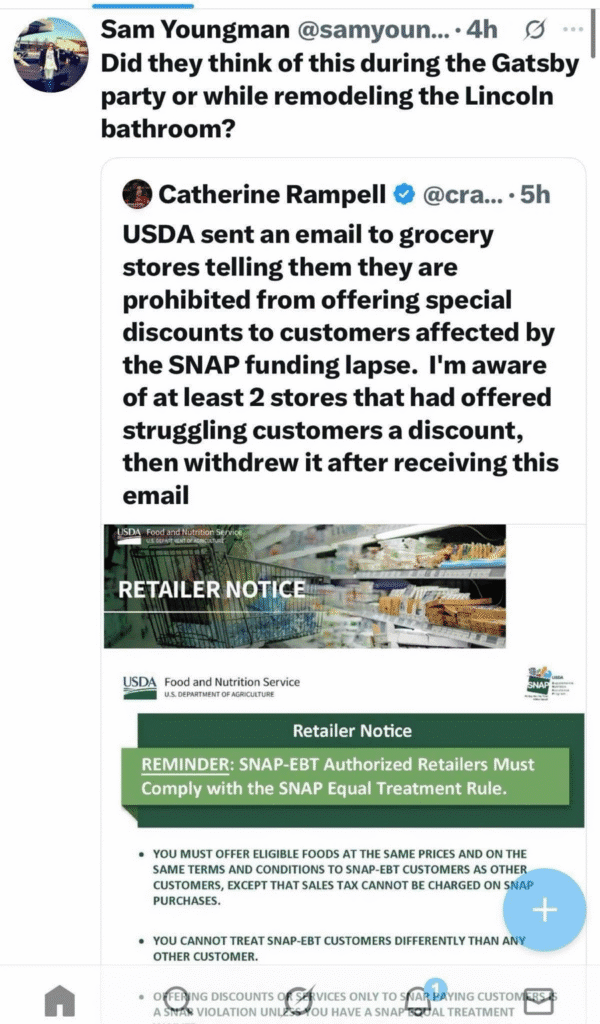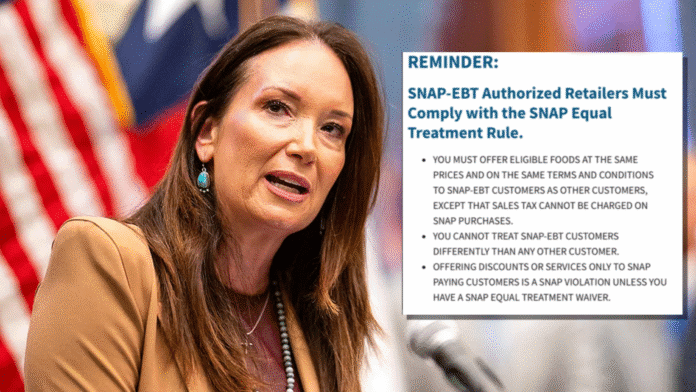The U.S. Department of Agriculture has issued a nationwide reminder warning grocery stores and small retailers not to offer discounts or special deals to families using SNAP or EBT, even as millions of Americans face delayed or reduced food benefits during the ongoing government shutdown.
The agency’s message cites the federal “Equal Treatment Rule” — a regulation found in 7 C.F.R. § 278.2(b) — which requires retailers that accept EBT to treat SNAP customers “exactly the same” as cash or credit customers. That means no special prices, no exclusive coupons, and no targeted discounts, even if those discounts are meant to help struggling families buy food.
But buried in that same notice is something the USDA didn’t highlight: the agency has the power to issue waivers to that rule. And during a crisis like this one, a blanket Equal Treatment Waiver could have allowed stores to legally provide those discounts and promotions to families in need.
Instead, the USDA chose to send a warning.

Threats Disguised as Reminders
The “reminder” sent to SNAP-authorized retailers isn’t just a friendly notice, it carries teeth. Under federal law, violating the Equal Treatment Rule can result in:
- Civil penalties and fines
- Suspension or permanent disqualification from the SNAP program
- Referral for enforcement actions by the Food and Nutrition Service (FNS)
For small stores in rural and low-income communities, losing the ability to process EBT transactions can destroy their business. The message was clear: even if your community is struggling, don’t try to help SNAP families unless we tell you that you can.
This warning comes at the same time the USDA has faced nationwide outrage and multiple federal lawsuits for refusing to use its $5 billion emergency reserve to continue SNAP funding during the shutdown.
Two federal judges ruled just days ago that the USDA’s refusal was unlawful, writing that the agency’s stance “rested on an erroneous construction of the relevant statutory provisions.” In other words, they had the money, they had the authority, and they had a legal duty to use it but chose not to unlawfully, until the court forced their hand. The Trump administration today announced they will not appeal the decision and comply with the order.
Waivers Are Legal — and Common
What makes this latest decision even harder to defend is that the USDA routinely uses its waiver authority in emergencies.
Under the Food and Nutrition Act of 2008 and corresponding regulations in 7 U.S.C. § 2014 and § 2016, the Secretary of Agriculture has broad authority to waive or modify SNAP requirements when “unusual circumstances” or “emergency conditions” make it necessary.
The USDA has used this authority many times in the past:
- After hurricanes, to allow hot food purchases with EBT cards.
- During wildfires, to extend certification deadlines and replace lost benefits.
- Throughout the COVID-19 pandemic, to suspend certain reporting and income verification rules.
In each of those cases, the agency recognized that strict adherence to normal rules would harm recipients and communities. But this time — during a shutdown in which families are running out of food and retailers are stepping up to help — the USDA has chosen to enforce, not assist.
Sidebar: The USDA’s Legal Authority to Issue Waivers
Legal Basis for Waivers:
The USDA’s authority to temporarily suspend or modify rules during emergencies comes from the Food and Nutrition Act of 2008, specifically:
- 7 U.S.C. § 2014(h)(1): Allows the Secretary of Agriculture to “permit the issuance of supplemental benefits, or make other adjustments as necessary” during disasters or unusual circumstances.
- 7 U.S.C. § 2016(b): Governs retailer requirements and authorizes exceptions when approved by the Secretary.
- 7 C.F.R. § 272.3(c)(1)(i): Authorizes the Food and Nutrition Service (FNS) to waive program requirements when compliance is impracticable due to emergencies or disasters.
These provisions give USDA officials broad discretion to issue blanket or regional waivers to protect access to food during crises — including allowing special pricing or benefits for SNAP recipients.
Examples of USDA Waivers in Past Emergencies
- Hurricane Katrina (2005): National waivers allowed SNAP households to buy hot, prepared foods and extended certification deadlines.
- Hurricane Maria (2017): Waivers permitted hot meals in Puerto Rico and temporary paper EBT vouchers due to outages.
- California Wildfires (2018): Waived interview and verification requirements so families could quickly replace lost benefits.
- COVID-19 Pandemic (2020–2021): Hundreds of waivers extended deadlines, expanded online purchases, and relaxed income verification rules.
- Hurricane Ian (2022): Waivers allowed hot food purchases and extended replacement deadlines for Floridians who lost food.
What They Could Have Done Now
Under these same laws and precedents, USDA could have:
- Issued a national Equal Treatment Waiver allowing stores to help SNAP users during the shutdown.
- Suspended enforcement of the Equal Treatment Rule temporarily.
- Clarified publicly that voluntary discounts for SNAP customers would not result in penalties.
Instead, the agency chose to issue a compliance warning — despite acknowledging the existence of waivers in the same memo.
A Clear Choice — and the Wrong One
The contrast couldn’t be clearer.
- Courts had to force the USDA to fund SNAP using the emergency reserves it already had.
- Then, instead of issuing a waiver to make it easier for local stores to help feed people, the agency warned those businesses they could be punished for doing so.
The same notice that mentions waivers as a legal option is the one being used to threaten stores that might use them.
This isn’t about the USDA’s ability, it’s about its willingness.

The agency’s decision to enforce technical compliance during a food crisis, rather than show compassion or flexibility, raises serious questions about priorities. It also exposes a growing perception that federal officials are politicizing hunger in the middle of a shutdown, using access to food assistance as a bargaining chip instead of a basic human obligation.
The USDA’s “equal treatment” rule exists to prevent discrimination against SNAP customers, not to prevent kindness. The law allows the agency to make exceptions during emergencies. It has done so many times before. But this time, when Americans are struggling the most, it chose to threaten businesses instead of help families.











